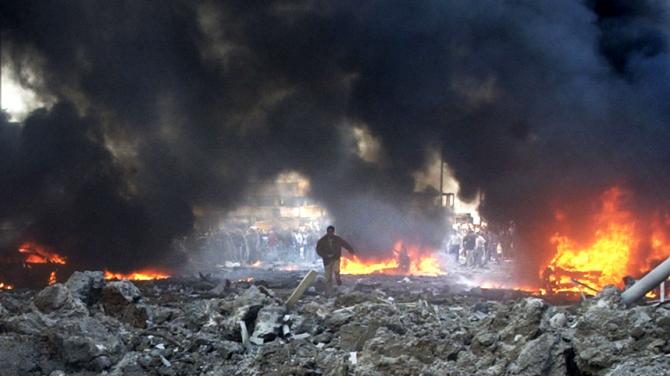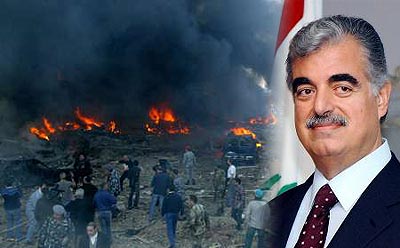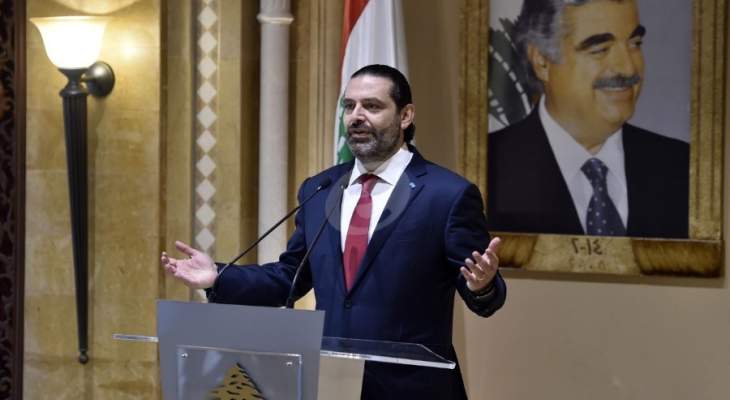Former prime minister says his party is ‘here to stay’ in first public speech since resigning in October amid protests.

By Timour Azhari
Beirut, Lebanon – Lebanon‘s former Prime Minister Saad Hariri has said he is charting a new political path from within his party after a 2016 deal with President Michel Aoun that brought him to power became “history”.
“I’m here, I’m not going anywhere; I’m staying in my country, in my house among my family and in political work,” Hariri said on Friday, in his first public speech since resigning on October 29 amid widespread protests against a ruling elite blamed for corruption and steering the country into an acute financial crisis.
Addressing a crowd of thousands of supporters outside his residence in the capital, Beirut Lebanon’s leading Sunni politician said he had received criticism from within his party over the past months and acknowledged “shortcomings” – but said “the decision now is to enact change”.

“The Future Movement will remain,” he said, referring to his party.
His comments came during a public event to mark the 15th anniversary of the assassination of his father, former Prime Minister Rafik Hariri.
Rafik Hariri was killed along with 21 others when a massive bomb exploded as his convoy passed through the centre of Lebanon’s capital, Beirut, on February 14, 2005.
Prosecutors at The Hague-based Special Tribunal for Lebanon investigating Hariri’s assassination have said that the Syrian government was at the heart of the plot, which was carried out by members of the pro-Iran Hezbollah group. Damascus and Hezbollah have denied involvement. A ruling in the case is expected this year.
In defence of ‘Haririism’
Members of the leaderless protest movement, as well as Hariri’s political opponents, have pointed to the policies of Hariri’s father – termed “political Haririism” and dating back to 1992 – as the source of Lebanon’s massive economic woes today.

The country is saddled by the third-largest debt burden in the world as a percentage of its gross domestic product and is facing the worst financial crisis in its history, which may soon push it to default on debt repayments.
Much of Friday’s event was dedicated to responding to these claims. A video aired at the beginning of the commemoration blamed Lebanon’s dire situation on a “series of obstructions” carried out by Lebanese parties allied with Syria over the years.
Hariri said that parties were continuing to blame “Haririism” today in order to cover for their own failures in governance.
He said the obstruction his father had endured at the hands of Syria’s allies continued under his own deal with Aoun, ultimately leading to the uprising Lebanon was currently witnessing.
Hariri also lashed out at Gerban Bassil, Aoun’s son-in-law and leader of the Free Patriotic Movement (FPM), describing him as the “shadow president” who sought to “eliminate” other parties and harmed Lebanon’s relations with Arab states along with Hezbollah.
Lebanon’s success depended on good relations with Arab states, Hariri said, adding: “Iran’s cash can solve the problems of a party, not of a country.”
Going forward, Hariri said he would continue to uphold ties with historical allies with whom relations have been strained in recent years over his deal with Aoun.
Electric swipe
Drawing a comparison between his own dealings and his father’s abilities to garner international support for Lebanon through donor conferences, Hariri pointed to the 2018 CEDRE conference, where the international community pledged $11bn in soft loans to Lebanon, conditional on reforms.
But rather than support those reforms, Hariri said that the FPM and its allies first obstructed the formation of a government after Lebanon’s 2018 election, then blocked the government’s work after it was formed, leaving the conference unrealised.
He also took aim at the FPM over the country’s decrepit electricity sector, which runs a yearly deficit that has over the years contributed about half of Lebanon’s $87bn public debt.
‘Here to stay’
Following his resignation, which saw him continuing in a caretaker capacity, Hariri had sought to return as prime minister but was ultimately replaced by Prime Minister Hassan Diab, whose cabinet recently gained Parliament’s confidence.
“Despite this recent setback, he remains a key figure in Lebanon’s political scene,” Maha Yahya, director of the Carnegie Middle East Center, told Al Jazeera.
Yahya said Hariri, through the large public event on Friday, was saying he might have lost the battle but it is far from over, while also looking to “reassert his political gravitas vis-a-vis both internal as well as external actors”.
Indeed, the heads of the parliamentary blocs of his two main allies, the Progressive Socialist Party and the Lebanese Forces, attended the gathering in central Beirut.
The Saudi ambassador to Lebanon, Walid al-Bukhari, was also in attendance.
“In the last two months we heard and saw that, ‘oh my, the Future Movement is gone and Saad travelled and isn’t coming back, and Saudi doesn’t want him and America doesn’t want him’,” Hariri said.
“Let them hear the truth that the Future Movement … is here to stay.”
Earlier, as he was walking through the crowd taking selfies with supporters and greeting officials before his speech, Hariri was closely followed by Lebanon’s Grand Mufti, Abdel-Latif Derian, who then sat beside him.
The messaging was clear: Hariri remains the leader of Lebanon’s Sunnis.
Al Jazeera

Leave a Reply
You must be logged in to post a comment.